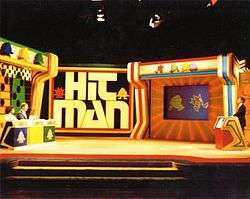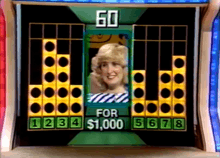Hit Man (American game show)
Hit Man is an American television game show. The show aired on NBC from January 3 to April 1, 1983, and was hosted by Peter Tomarken.[1] Rod Roddy was the announcer, and was produced by Jay Wolpert Productions in association with Metromedia Video Productions.
| Hit Man | |
|---|---|
 | |
| Created by | Jay Wolpert |
| Directed by | John "The Fox" Dorsey |
| Presented by | Peter Tomarken |
| Narrated by | Rod Roddy |
| Theme music composer | Paul Epstein for Score Productions |
| Country of origin | United States |
| No. of episodes | 65 |
| Production | |
| Executive producer(s) | Jay Wolpert |
| Producer(s) | Roger Speakman Randy Neece |
| Production location(s) | NBC Studios Burbank, California |
| Running time | 22 minutes (without commercials) |
| Production company(s) | Jay Wolpert Productions Metromedia Video Productions |
| Release | |
| Original network | NBC |
| Original release | January 3 – April 1, 1983 |
Game play
Four contestants competed on each episode of Hit Man in a memory-based quiz game.[2] One was either a returning champion or champion-designate, with the other three contestants competing for the right to face the champion in the second round. The surviving contestant at the end of two rounds of play played the Triple Crown bonus round for $10,000.
Round 1
Each game of Hit Man began with the three challengers, who were sitting behind desks colored blue, yellow, and green, viewing a short film narrated by Tomarken. Film topics varied widely and included biographies, the "making-of" specific films, professions, hobbies, etc. The film was also shown to the returning champion offstage, since the subject matter would later come up in the Triple Crown if he/she advanced to the round.
After the film concluded, a series of tossup questions were asked to the challengers about the film they had just seen. For each correct answer the challengers gave, he or she advanced one step on a ladder displayed behind them. Answering a question incorrectly locked a contestant out of the next question.
It took five answers to climb to the top of the ladder, and the first contestant to do this won $300 and clinched a spot in the second round. The remaining two contestants continued playing until one of them gave a fifth correct answer, and that contestant won $200 and ended the round. The remaining contestant was eliminated from further play and received parting gifts.
Round 2
For the second round, the champion entered the game and sat behind a red desk that was elevated. A second short film was played. After the film concluded, each contestant was given a series of "hit men". The champion was given seven hit men, the winner of the first round got four, and the second finisher was given three hit men, with each player's hit men corresponding to the color of their desk.
As before, a series of tossup questions pertaining to the film were asked. The object for all three players was to eliminate the opposing hit men, with the champion trying to eliminate both challengers while avoiding losing his/her own hit men. The winner of the first round was given a choice of whether to play against the champion first or allow the runner up to play.
Any correct answer knocked an opponent's hit man off the board, while any incorrect answer cost a player one of their own. If the champion lost a hit man, the challenging player kept control until either eliminating all of the champion's hit men or having one of their own hit men eliminated. Once the latter happened, control passed to the other player. If at any point a challenger ran out of hit men, that player was eliminated from further play and the game continued.
If the champion managed to eliminate the challengers' hit men first, he/she retained the championship and advanced to the Triple Crown. If the champion lost all of his/her hit men, the challenger who knocked the last hit man off the board became champion.
Triple Crown

The gameboard displayed eight columns with varying numbers of circles. One column held one circle; two columns held two circles; two columns held three circles; two columns held four circles; and the final column held five circles. The contestant turned his/her back to the board, and the columns were randomly re-ordered.
The contestant had 60 seconds to answer questions based on either of the day's two stories. The clock started as soon as he/she chose a column, and each correct answer placed a "money man" in one of its circles. The contestant chose a new column after a pass or wrong answer, or after filling every circle in the column.
If the contestant filled any three columns with money men before time expired, he/she won $10,000. If he/she either ran out of time or exhausted all eight columns, he/she won $1,000 for each one filled.
The champion competed again on the next show unless beaten or played five Triple Crown rounds, whichever came first.
Broadcast History
Hit Man premiered as one of three new game shows on NBC's daytime schedule, along with the new Just Men! and a revival of Sale of the Century, that the network commissioned to replace the cancelled serials Texas and The Doctors. Hit Man and its lead-in program, Wheel of Fortune, were moved to the slot Texas had occupied, with Hit Man airing at 11:30 AM Eastern.
Although NBC was drawing better ratings in the hour, Hit Man suffered from ratings trouble against the second half of The Price is Right on CBS and reruns of The Love Boat on ABC and the network did not renew the series beyond its original sixty-five episode commitment. The show was replaced by Dream House hosted by Bob Eubanks. Hit Man and Just Men! both ended their runs on the same day, but Sale continued for another six years, ending in 1989.
Peter Tomarken later hosted Press Your Luck, which debuted in September 1983 (five months after Hit Man ended) and ran for three years on CBS. Rod Roddy reunited with Tomarken as the announcer of Press Your Luck, and later became Johnny Olson's permanent replacement in 1986 as announcer on The Price Is Right. Roddy held this position until his death in 2003.
Other versions
A British version of Hitman was aired on ITV in 1989 between February 21 to May 30. It was presented by Nick Owen.
Portugal had a version of Hit Man called Babylon.
- Hyatt, Wesley (1997). The Encyclopedia of Daytime Television. Watson-Guptill Publications. p. 213. ISBN 978-0823083152. Retrieved 22 March 2020.
- Baber, David (2009). Television Game Show Hosts: Biographies of 32 Stars. McFarland & Co. p. 251. ISBN 9780786445738. Retrieved 26 March 2020.